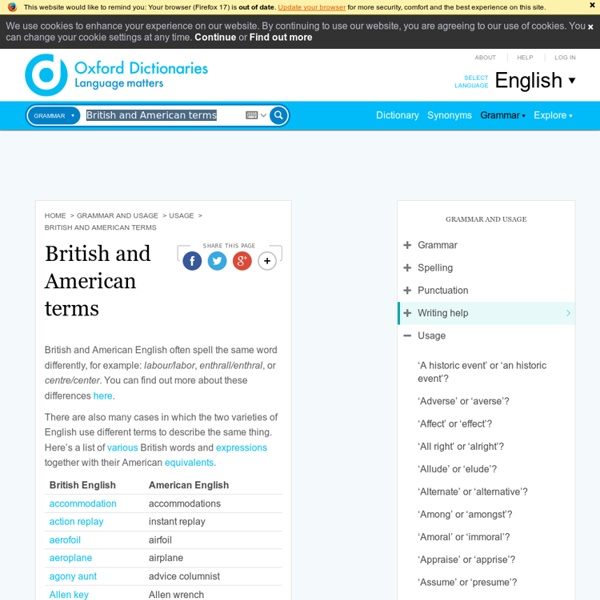British and American terms
British and American English often spell the same word differently, for example: labour/labor, enthrall/enthral, or centre/center. You can find out more about these differences here. There are also many cases in which the two varieties of English use different terms to describe the same thing. Here’s a list of various British words and expressions together with their American equivalents. Back to usage. You may also be interested in Shall or will? Commonly confused words Can or may?
British English and American English
British English and American English British people and American people can always understand each other – but there are a few notable differences between British English and American English Grammar Americans use the present perfect tense less than speakers of British English and a British teacher might mark wrong some things that an American teacher would say are correct. US Did you do your homework yet? In British English, ‘have got’ is often used for the possessive sense of ‘have’ and ‘have got to’ is informally used for ‘have to’. Brit. There are a number of other minor grammatical differences. Vocabulary There are a lot of examples of different words being used in British and American English. angry (Brit.) = mad (US) autumn = fall boot (of a car) = trunk chemist’s = drug store cupboard = closet flat = apartment lift = elevator nappy = diaper pavement = sidewalk petrol = gas/gasoline rubbish = trash tap = faucet trousers = pants Spelling US theater, center Brit. theatre, centre
Words Brits Use That Americans Stopped Using | Grammarly
A quick example of the bleeding obvious: people speak differently in the UK and the US. If you’re an American fan of British TV shows—the originals, not the American remakes—you’re probably very aware that once in a while, the characters will utter a word that you won’t hear on the streets of your hometown. But you may be surprised to know that some of the words we consider distinctly British today were once fairly common in the United States. Read on: 1 Tetchy, adjective Someone who is tetchy is someone with a bad temper: You can’t even talk with him these days; he’s just too . 2 Amongst, preposition While amongst is less favored than among in British English, it’s rarely seen at all in American English. There’s a grammar pedant us, and I intend to find out who he is. 3 Marvelous, adjective Sure, you can use amazing instead, but marvelous sounds so much more . . . marvelous: We had a time during that holiday retreat. We try to get together for a family meal once a . , that escalated quickly!
Differences Between American and British English
By Kenneth Beare While there are certainly many more varieties of English, American English and British English are the two varieties that are taught in most ESL/EFL programs. Generally, it is agreed that no one version is "correct" however, there are certainly preferences in use. Pronunciation - differences in both vowel and consonants, as well as stress and intonation Vocabulary - differences in nouns and verbs, especially phrasal verb usage Spelling - differences are generally found in certain prefix and suffix forms The most important rule of thumb is to try to be consistent in your usage. Use of the Present Perfect continue reading below our video Loaded: 0% Progress: 0% In British English the present perfect is used to express an action that has occurred in the recent past that has an effect on the present moment. I've lost my key. In British English the above would be considered incorrect. British English: American English: Possession Do you have a car? She's got a beautiful new home.
Related:
Related:



